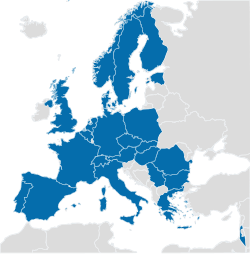
Back CERN AF CERN ALS Organización Europea ta la Investigación Nucleyar AN سيرن Arabic Organización Europea pa la Investigación Nuclear AST CERN AZ CERN BE CERN BE-X-OLD Европейска организация за ядрени изследвания Bulgarian নিউক্লীয় গবেষণার জন্য ইউরোপীয় সংস্থা Bengali/Bangla
Organisation européenne pour la recherche nucléaire | |
 | |
 CERN's main site in Meyrin, Switzerland, looking towards the French border | |
 States with full CERN membership | |
| Formation | 29 September 1954[1] |
|---|---|
| Headquarters | Meyrin, Geneva, Switzerland 46°14′03″N 6°03′10″E / 46.23417°N 6.05278°E |
| Membership | Full members (24): |
Official languages | English and French |
Council President | Eliezer Rabinovici[2] |
| Fabiola Gianotti | |
| Budget | 1405m CHF[3] (2022) |
| Website | home |
The European Organization for Nuclear Research, known as CERN (/sɜːrn/; French pronunciation: [sɛʁn]; Organisation européenne pour la recherche nucléaire), is an intergovernmental organization that operates the largest particle physics laboratory in the world. Established in 1954, it is based in Meyrin, western suburb of Geneva, on the France–Switzerland border. It comprises 24 member states.[4] Israel, admitted in 2013, is the only full member geographically out of Europe.[5][6] CERN is an official United Nations General Assembly observer.[7]
The acronym CERN is also used to refer to the laboratory; in 2019, it had 2,660 scientific, technical, and administrative staff members, and hosted about 12,400 users from institutions in more than 70 countries.[8] In 2016, CERN generated 49 petabytes of data.[9]
CERN's main function is to provide the particle accelerators and other infrastructure needed for high-energy physics research – consequently, numerous experiments have been constructed at CERN through international collaborations. CERN is the site of the Large Hadron Collider (LHC), the world's largest and highest-energy particle collider.[10] The main site at Meyrin hosts a large computing facility, which is primarily used to store and analyze data from experiments, as well as simulate events. As researchers require remote access to these facilities, the lab has historically been a major wide area network hub. CERN is also the birthplace of the World Wide Web.[11][12]
- ^ James Gillies (2018). CERN and the Higgs Boson: The Global Quest for the Building Blocks of Reality. Icon Books Ltd. ISBN 978-1-78578-393-7.
- ^ "Prof. Eliezer Rabinovici is the new president of the CERN Council". Jerusalem Post. 25 September 2021. Retrieved 1 November 2021.
- ^ "Final Budget of the Organization for the sixty-eighth financial year 2022" (PDF). CERN. Archived (PDF) from the original on 9 October 2022. Retrieved 9 September 2022.
- ^ CERN (2020). "Governance". CERN Annual Report. 2019. CERN: 50. doi:10.17181/ANNUALREPORT2019.
- ^ "CERN to admit Israel as first new member state since 1999 – CERN Courier". cerncourier.com. 22 January 2014.
- ^ "CERN accepts Israel as full member". The Times of Israel. 12 December 2013. Retrieved 10 November 2022.
- ^ "Intergovernmental Organizations". United Nations.
- ^ CERN (2020). "CERN in figures". CERN Annual Report. 2019. CERN: 53. doi:10.17181/ANNUALREPORT2019.
- ^ "Discovery machines". CERN Annual report 2016. Annual Report of the European Organization for Nuclear Research. Vol. 2016. CERN. 2017. pp. 20–29.
- ^ "The Large Hadron Collider". CERN. Retrieved 29 May 2021.
- ^ McPherson, Stephanie Sammartino (2009). Tim Berners-Lee: Inventor of the World Wide Web. Twenty-First Century Books. ISBN 978-0-8225-7273-2.
- ^ Gillies, James; Cailliau, Robert (2000). How the Web was Born: The Story of the World Wide Web. Oxford University Press. ISBN 978-0-19-286207-5.